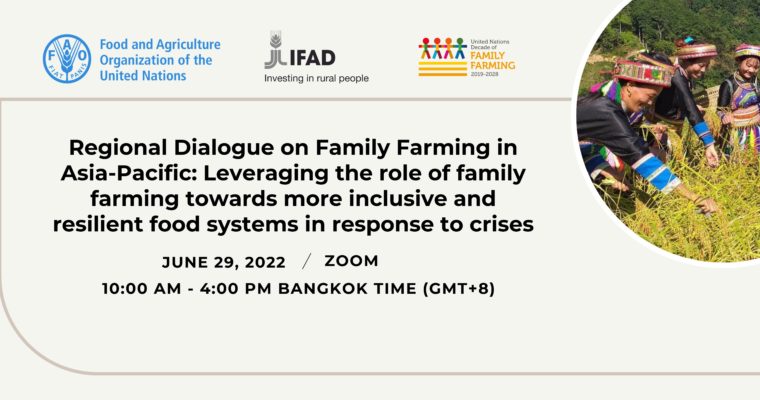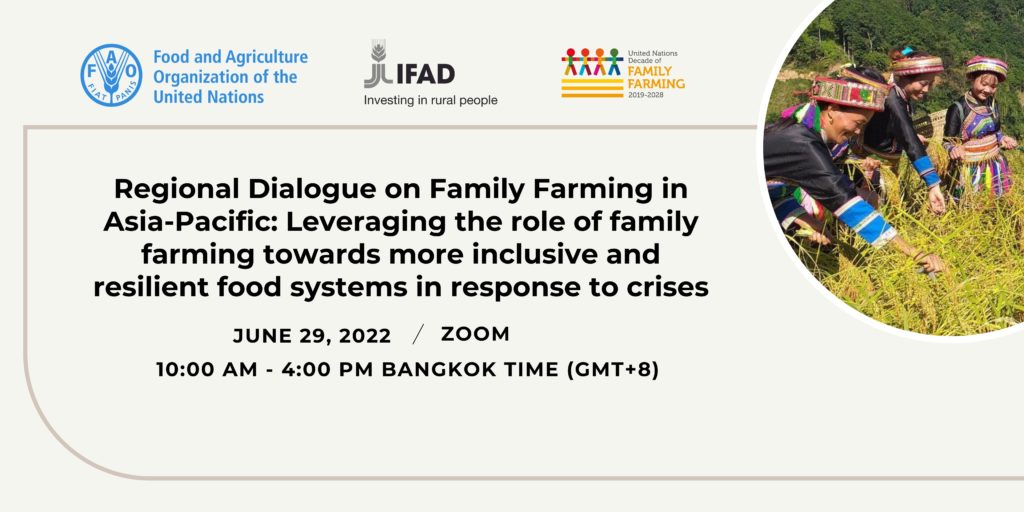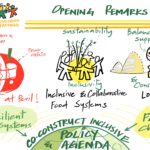Regional Dialogue on Family Farming in Asia and the Pacific:
Leveraging the role of family farming towards more inclusive and resilient food systems in response to crises
29 June 2022 | 10:00 – 16:00 GMT+7 (Bangkok)
The UN Decade of Family Farming 2019-2028 (UNDFF), a joint initiative of the Food and Agriculture Organization of the United Nations (FAO) and the International Fund for Agricultural Development (IFAD), was launched on 29 May 2019 at the FAO headquarters in Rome as a framework for countries to develop public policies and investments to support family farming from a holistic perspective. After three years of implementation, the Global Forum of the UNDFF will take stock of the process on 19-22 September 2022. In preparation for the Global Forum, FAO and IFAD, with the support of an informal preparatory group representing Family Farmers’ Organizations–Asian Farmers Association for Sustainable Rural Development (AFA), Asian Partnership for the Development of Human Resources in Rural Asia (AsiaDHRRA), La Via Campesina, and Pacific Island Farmers Organisation Network (PIFON) are organizing a Virtual Regional Dialogue on Family Farming for Asia and the Pacific on 29 June 2022.
Background
The UN Decade of Family Farming 2019-2028 (UNDFF) was launched on 29 May 2019 at FAO headquarters, Rome. The UNDFF aims to shed new light on what it means to be a family farmer in a rapidly changing world and highlights more than ever before the important role family farmers play in eradicating hunger and shaping our future of food. It serves as a framework for countries to develop public policies and investments to support family farming from a holistic perspective, unleashing the transformative potential of family farmers to contribute to achieving the Sustainable Development Goals (SDGs). FAO and IFAD have been called to support the implementation[1] and established a joint FAO/IFAD Secretariat to facilitate this process under the guidance of an International Steering Committee composed by Member States and Family Farming Organizations.
The UNDFF leverages family farmers to promote an inclusive rural transformation that contributes to reducing rural poverty, generating and distributing wealth, creating decent jobs, starting-up and growing inclusive agri-food businesses where the environment is sustainably managed and the agricultural and food heritage is preserved.
To this end, the UNDFF focuses on promoting strategies and interventions that grant family farmers access to natural and productive resources, information, markets, technology and innovation, thus addressing the multiple constraints that family farmers face in order to increase productivity and income, improve nutrition and livelihoods, while adapting to, and mitigating the impact of, climate change, sustainably managing natural resources and conserving biodiversity.
The Global Forum
After three years of implementation, the UNDFF can be seen as a robust engagement process involving a wide range of stakeholders, aimed at identifying and implementing concrete policies and measures in support of family farming.
To take stock of processes, activities and results in 2019 – 2021, the Global Forum of the UNDFF, co-organized by FAO-IFAD in their responsibility of leading UN agencies, will be held 19 to 22 September 2022. The event aims at leveraging the views of different relevant actors to better understand the successful experiences that can be the basis for knowledge sharing and dissemination of good
practices; the main challenges faced in dealing with implementation in different contexts; and the policy areas and key topics that emerge as priorities to focus on for the next period of implementation.
The Regional Dialogues: Rationale
The Global forum will be preceded by Regional Dialogues, to be organized in collaboration with FAO and IFAD Regional Offices. The Regional Dialogues aim at giving all actors in the region the opportunity to connect, reinforcing multi-actor collaboration addressing emerging topics and context-specific key challenges on a regional scale towards the implementation of the UNDFF.
The format, structure and the thematic focus of each Regional Dialogues are decided in agreement with the FAO and IFAD Regional Offices, relevant family farmers’ organizations and other stakeholders from the region, to better tailor the event to each region’s specific needs and context.
Discussions held in the framework of the Regional Dialogues will be systematized and reported at relevant sessions of the Global Forum (19 -22 September), feeding the UNDFF way forward and capitalizing on the emerging key topics and priority areas discussed at the regional level.
The Regional dialogue on the UNDFF in the RAP Region
During the first three years of implementation of the UNDFF in the RAP region, significant results have been achieved. One can mention for instance the development of the SAARC Regional Action Plan for Family Farming, as well as the development of National Action Plans for Family farming in Indonesia (implementation phase), Nepal and Philippines (officially launched on 21st July 2021). In other countries like Bangladesh, Cambodia, India, Japan or Lao PDR, mobilization of stakeholders to develop the NAP have also started. Other initiatives, such as those linked to the UN Food System Summit or the communication campaigns supported by ComDevAsia, have contributed as well to advance the agenda of Family Farming across the region.
Nevertheless, significant challenges arise or were exacerbated in the region due to the regional impact of global crises, such as impacts of the breakout of COVID-19 on family farmers’ livelihoods and the consequences of the conflict between Russia and Ukraine on the global food markets (and production inputs). These global crises are interacting with the specific social, economic, and environmental conditions in the region, and require tailored interventions to mitigate their impact and to strengthen family farmers’ resilience and contribution to food security and nutrition.
Following initial informal consultations with the main apex organizations of Family Farmers Organizations (such as the Asian Farmers Association, La Via Campesina, and PIFON) and a regional NGO (DHRRA), 3 main technical themes have been identified to be focused on during the upcoming regional dialogue:
- The contribution of Family Farmers Organizations to sustainable and climate resilient food systems (in reference but not only to the Pillar 6 of the Global Action Plan on Promoting sustainability of family farming for climate-resilient food systems)
- Fostering the inclusion of rural youth (in reference but not only to the Pillar 2 of the Global Action Plan on supporting youth and ensure the generational sustainability of family farming)
- Building the capacities of Family Farmers Organization (including appropriate financial services and business model) and ensuring effective participation through appropriate financing and implementation modalities (in reference but not only to the Pillar 4 on Strengthening family farmers’ organizations and their capacities to generate knowledge, represent farmers’ concerns and provide inclusive services in rural areas)
Addressing the above themes, the Regional Dialogue aims at stimulating a common reflection on how to leverage the role of family farming towards more inclusive and resilient food systems. The main outcomes of the discussion will be systematized and reported in the framework of the Global Forum in September 2022, as part of the technical discussions linked to the seven Pillars of work of the UNDFF Global Action Plan.
Co-organizers: FAO and IFAD, supported by an informal preparatory group representing Family Farmers’ Organizations and regional rural development NGOs (AFA, AsiaDHRRA, La Via Campesina, PIFON)






Comments are closed